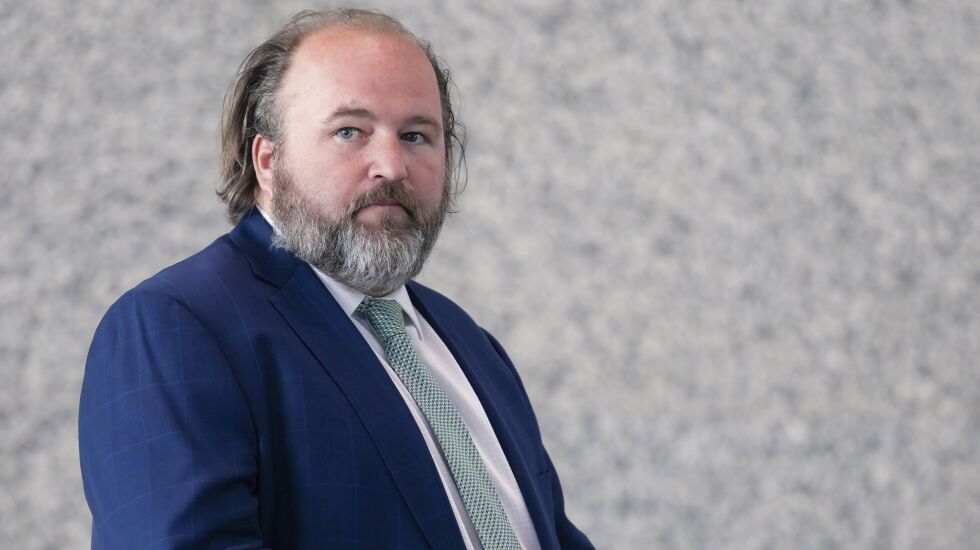
The federal corruption case against a businessman accused of bribing two state lawmakers could be in the hands of jurors Thursday morning after a prosecutor told them laws should be changed “based on the power of the ideas instead of the size of the pocketbook.”
But a defense attorney for James T. Weiss, a son-in-law of former Cook County Assessor Joseph Berrios, countered that “there’s just simply not enough evidence to find [Weiss] guilty beyond a reasonable doubt.”
The lawyers made their comments Wednesday amid closing arguments that lasted more than two hours but did not conclude before Weiss’ trial wrapped for the day.
So a prosecutor is expected to give a brief rebuttal when the trial resumes Thursday. Then the jury of five men and seven women will begin considering the evidence heard across five days of trial.
Weiss is accused of paying $32,500 in bribes to then-state Rep. Luis Arroyo, a Democrat, to push legislation to explicitly legalize unregulated gambling devices known as sweepstakes machines. When a landmark gambling bill passed without the sweepstakes language, the men allegedly paid bribes to then-state Sen. Terry Link, a key lawmaker on gaming.
Link, also a Democrat, happened to be secretly cooperating with the FBI, though. He has since left the Senate, pleaded guilty to filing a false tax return and is awaiting sentencing.
Defense attorneys have insisted the payments made by Weiss to Arroyo in 11 checks between November 2018 and October 2019 were not bribes but legitimate fees for Arroyo’s help blocking an ordinance before the Chicago City Council. They also told the jury Wednesday that Weiss was not involved in the bribery deal between Arroyo and Link.
But Assistant U.S. Attorney Sean Franzblau told jurors that Weiss’ payments to Arroyo were “bribes, plain and simple.” He noted that Weiss had been seen following Arroyo through the halls of the Capitol, watching as Arroyo badgered other lawmakers about the legislation.
“[Arroyo] was getting paid to do it,” Franzblau said. “The defendant was getting bang for his buck.”
Weiss and Arroyo met with Link at a Highland Park Wendy’s on Aug. 2, 2019. At one point, Link asked Arroyo to speak to him alone outside. Franzblau said Link was instructed by the FBI not to specifically solicit a bribe from Arroyo, so Link simply asked, “What’s in it for me?”
On Wednesday, the prosecutor snapped his fingers in the air as he told jurors those words switched Arroyo “immediately into corruption mode.” Arroyo responded by telling Link he was a “paid consultant” making $2,500 a month and that the same could be arranged for Link.
Despite defense arguments to the contrary, Franzblau said the FBI did not create the bribe at the center of Weiss’ case. He said “the FBI simply walked up to a corrupt relationship” and “gave it a little nudge.”
“And another bribe came tumbling out,” Franzblau said.
The prosecutor showed jurors a picture of a folder containing a check from Weiss’ business, proposed legislation and a business card. It had been passed by Arroyo to Link at Sander’s restaurant in Skokie during a follow-up meeting on Aug. 22, 2019.
“When you send someone to meet with a state senator at a Sander’s pancake house with a blank check and a draft piece of legislation, you are paying a bribe,” Franzblau said.
The check had been made out for $2,500, but no name had been written on the check. Link told Arroyo to make it out to “Katherine Hunter,” a fictional person invented by the FBI as part of the investigation.
Defense attorney Ilia Usharovich painted a drastically different portrait during his final argument to the jury. He suggested Arroyo was “fighting the entire gambling industry” to get sweepstakes legislation passed for small businesses in a “dirty” state Capitol where other lawmakers were “on the payroll” of traditional video gaming businesses through campaign contributions.
Arroyo has admitted taking bribes from Weiss and is serving a nearly five-year prison sentence for it.
Usharovich said the public was “cheated” by the lawmakers who testified in Weiss’ trial, including Link, state Rep. Robert “Bob” Rita and former state Sen. Antonio “Tony” Munoz.
“They made you guys losers,” Usharovich told the jury, because the state never reaped the additional revenue that would have been created by sweepstakes gaming.
Though Arroyo might have fallen for the FBI’s ruse and offered Link a bribe, Usharovich argued that Arroyo and Link “never told [Weiss] about their deal.”
And finally, the defense attorney insisted that if Weiss had set out to bribe Arroyo and Link, he wouldn’t have done so with checks.
He told the jury that “bribes come in cash. Because you don’t want a record.”
“If this was a bribe, it would have been done with a big bag of cash.”







